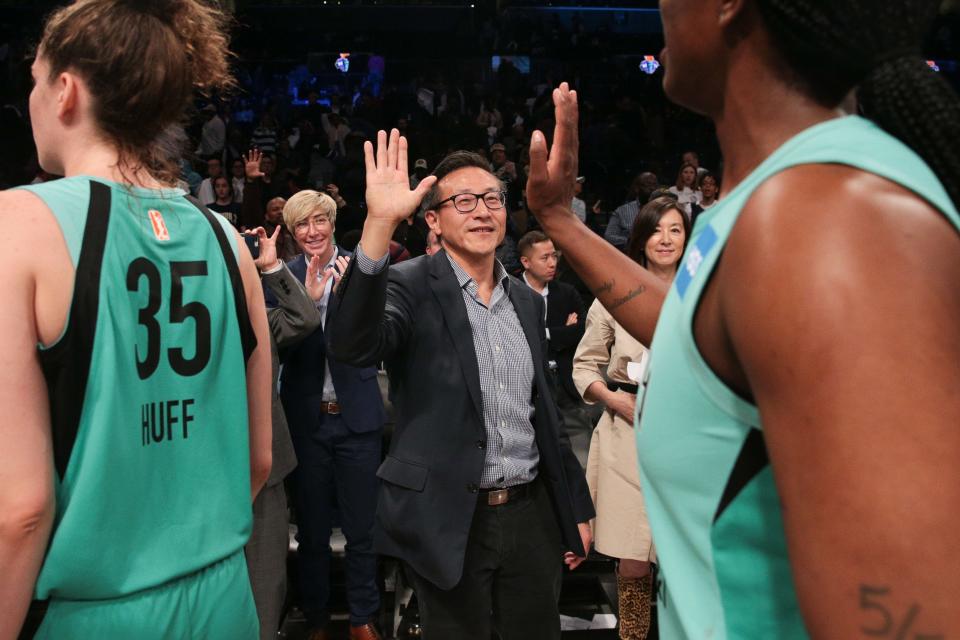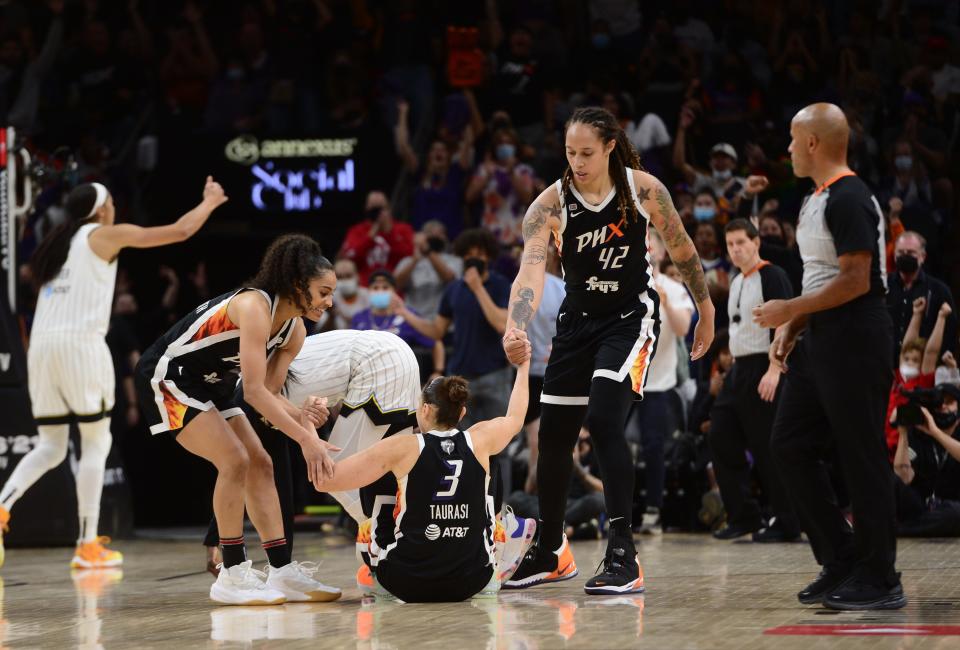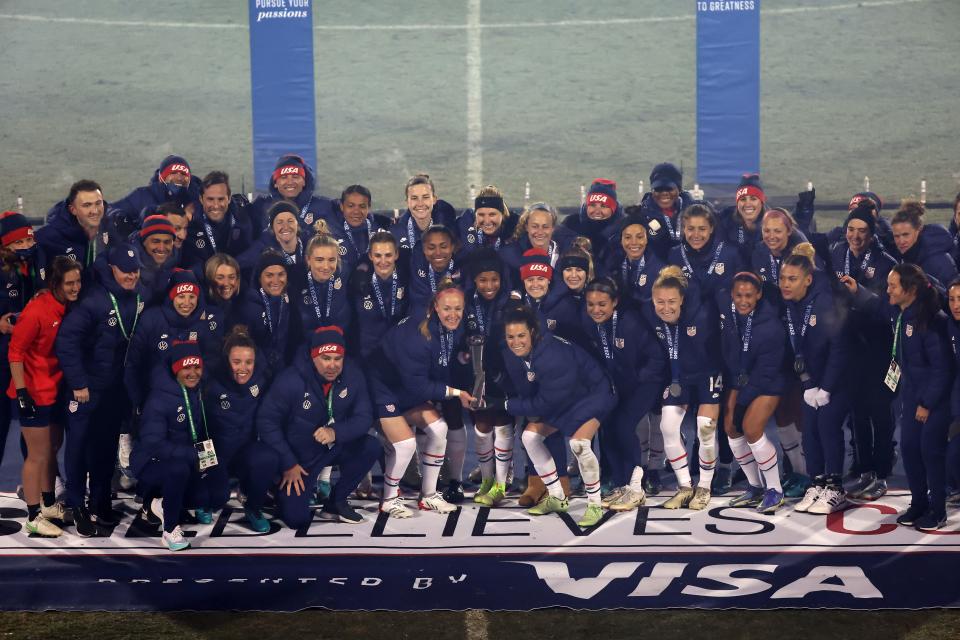Kempt: WNBA chartered flights 'scandal' latest example of inequality in women's leagues

This had nothing to do with money.
Last week, the WNBA fined the New York Liberty a whopping $500,000 for using chartered flights for its players during the second half of the 2021 season, all paid for by team owners Joe and Clara Wu Tsai.
Contrary to popular belief, this fine was not because the Liberty was siphoning money from the league or its big brother — the NBA.
It is true that the average WNBA team with its own profits cannot afford luxuries like chartered flights and five-star hotels on the road. Heck, the teams can’t afford their own arenas. Nearly every WNBA team shares a court with their NBA or G-League counterpart or with a local university.
The league has been very frugal with its money, and rightfully so. But when an individual franchise wants to treat its athletes like the professionals they are out of its own pockets, who is the WNBA to tell them that they can’t?
More: What seed is Louisville in the ACC Tournament? How to watch and stream postseason games
Why was the Liberty basketball team fined?
According to the league’s new collective bargaining agreement (CBA), teams are not allowed to travel in anything more than “premium economy” flights, as they deemed it an unfair competitive advantage.
Is this the same league that allowed Diana Taurasi, Brittney Griner, Skylar Diggins-Smith, Tina Charles and Diamond DeShields to form a super team down in Phoenix?

What do we consider an “unfair competitive advantage?”
Just to be clear, I’m not complaining about the Mercury. I think they should be allowed to form the next 2019 Golden State Warriors if they have the trades, draft picks and salary cap to do so.
Why? Because just like the NBA — this is the big leagues.
And if the WNBA itself doesn’t hold itself to the standards of a big league, then how does it expect the people they want to pay big-league prices for tickets, jerseys, and TV subscriptions to think of it as such?
It is up to the individual owners, cities and sponsors to help set their respective teams up for success.
Does the WNBA believe that there aren’t competitive advantages in every professional male sport? Does it believe the small-market New Orleans Pelicans have the same resources, appeal and persuasiveness as the big-market Los Angeles Lakers?
More: Could next season's Kentucky basketball senior night include Oscar Tshiebwe?
That new CBA signed in 2020 allows the players to now get paid 50% of the league’s revenue just as the NBA does. Before then and since its inception in 1996, players were only receiving 25% of the revenue.
That bump means the average player compensation will be six figures, around $130,000.
Needless to say, these pros aren’t necessarily getting paid big bucks to put their bodies on the line every day, especially when their male counterparts are making an average of $7.9 million last season.
Similar issues in March Madness and U.S. Women's National Soccer
Of course, we can talk about how much more the NBA brings in annually than the WNBA, and agree (or disagree) that allowing the players of each side to make the same percentage of their respective profits is more on par with equality than what they were receiving before.
It’s bad business to shell out more money than what’s coming in. Call it Economics 101.
But what doesn’t make sense is for the WNBA and its players who have fought so hard for two decades to be seen as equal to the men’s league, to be getting in its own way of progress.
This time, the league cannot blame the disparity on money. It was not the issue.
The Liberty’s billionaire owners took matters into their own hands and decided to treat their players like pros. And mind you, the Liberty is far from the all-star Mercury team, going 14-40 over the past two seasons but has one of the brightest young stars in Sabrina Ionescu.
It wasn’t about wins or a “competitive advantage” for the owners, but about being gracious to a group of women who work their butts off for the franchise. Yet the league gets to dictate how a team travels on their own dime and must resort to premium economy seats on a commercial flight (raise your hand if you didn’t know that was a thing).
Imagine 6-foot-9 Griner or 6-8 Liz Cambage squeezing in next to you on your next flight to Vegas. And though there are different stipulations, this disparity between the sexes trickles down to the NCAA and over to U.S. Women’s National Soccer Team.
Both leagues have been in the spotlight in recent years for their treatment of women athletes. Last March, Oregon women’s basketball player Sedona Prince posted a video to Tik Tok and Twitter which compared the large weight room that men had access to in the NCAA Tournament, and the essentially non-existent one for the women.
Inequity in sports: U of L, UK respond to disparity in weight rooms at men's and women's NCAA Tournaments
I’m at the edge of my seat to see how this year’s amenities at the NCAA Tournaments will compare to last year.

And the USWNT is arguably the most dominant American sports team — men or women — in recent history, winning four World Cup titles, four Olympic gold medals, eight CONCACAF Championships and Gold Cups, five SheBelieves Cup trophies, 10 Algrave Cup titles and seven Four Nations Tournament trophies over the past 30 years.
The men? Eh, you don’t want to know.
Yet the men have historically made millions more than the women in salary while struggling to even qualify for the world’s biggest tournaments. The USWNT sued their employer, and just this week reached a new settlement in which U.S. Soccer will pay $22 million to the players.
But money isn’t the only inequity the soccer team is fighting for.
"The women’s national team players raise issues not just about compensation but also safe work environments (they are put at risk more frequently by having to play on non-grass fields than the male players); travel (the men fly charter, while the women fly commercial); ticket prices (which are lower for WNT games compared to the men); and marketing efforts (less of an investment in the women’s game)," Ellen J. Staurowsky, a professor of sport management at Drexel University, told politifact.com.
Sound familiar?
Despite the inspirational “girl power” commercials you’ve seen on TV from the WNBA, NCAA and U.S. Soccer, it has been clear for decades that the inequity issue starts from within.
No business can thrive without the profit of its consumers, but a business is dead on arrival when the company doesn’t even believe in itself.
Let’s start there.
This article originally appeared on Louisville Courier Journal: Kempt: WNBA chartered flights 'scandal' shows long history of inequity

